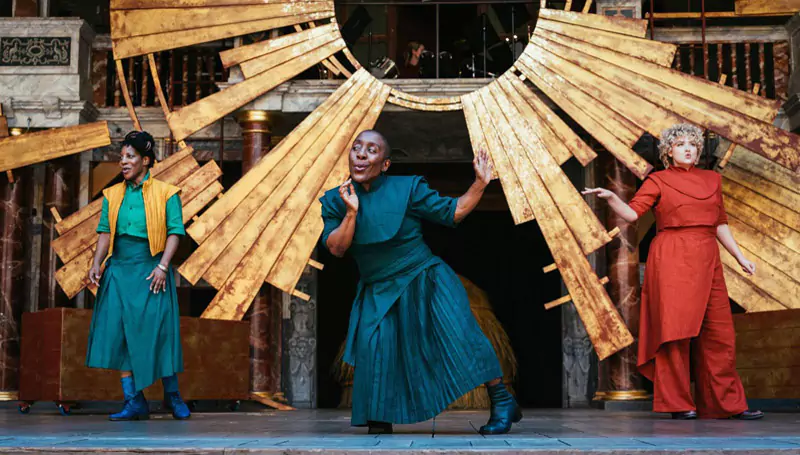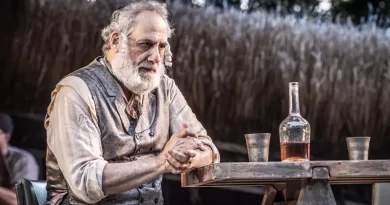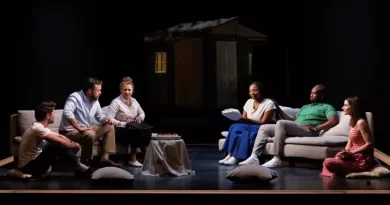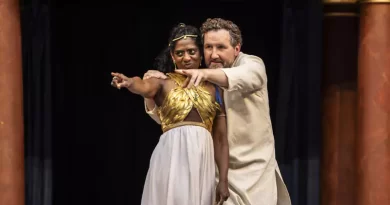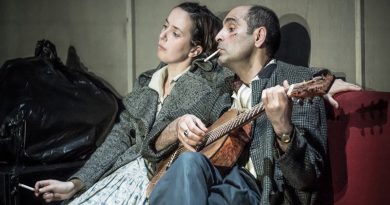“Twelfth Night” at the Globe Theatre
Neil Dowden on the South Bank
24 August 2025
★★★★
Shakespeare’s Twelfth Night – as its name suggests – was originally intended as an entertainment for the end of the Christmas season, and is still often performed around that period today. But Robin Belfield’s production at the Globe takes its cue from Olivia’s response to Malvolio’s strangely altered behaviour, “Why this is very midsummer madness”, in its fun-filled, high-energy celebration of a summer festival. The result is indeed a riot of laughter, though the play’s melancholic undertones and erotic tensions are left in the shade of a sunny boisterousness.
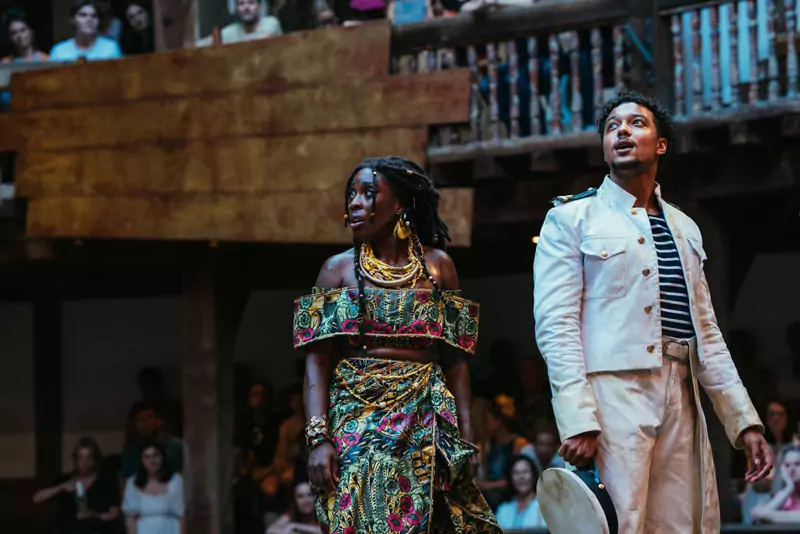
Ronkẹ Adékoluẹjo and Joshua John.
Photo credit: Helen Murray.
Jean Chan’s eye-catching design sets the tone. The stage is dominated by a huge cartoon-like, wooden-slatted sun with its rays spreading out into the audience in the lower galleries, while through a hole in the centre can be glimpsed the musicians on the balcony. The brightly coloured costumes add to the festive, almost pagan spirit of sun worshippers in headdresses who cavort around the stage, with Orsino, Duke of Illyria, adorned with a sun-like halo and upper breastplate. Wheat sheaves suggest harvest time, while Cesario and Aguecheek clumsily brandish farming implements in their mock fight. Simon Slater’s wonderful, up-tempo, brassy score has a jazzy cabaret quality that enhances the feelgood vibe.
This carnivalesque mood of anarchic merriment, where conventions are challenged and hierarchies upended, suits a work where gender roles and power dynamics are played with, even if it doesn’t do justice to Twelfth Night’s subtly bittersweet modulations. Orsino’s unrequited love for Olivia seems the affectation of someone in love with love, while Olivia’s seven-year mourning for her dead brother seems equally overdone (there is a witty touch when her and her ladies’ black veils are matched by a massive veil-like curtain descending from the flies to cover the musicians). The shipwrecked twins Viola and Sebastian are (separately) seduced by Illyria’s magical charm where nothing is what it seems, as they cannot resist falling in love.
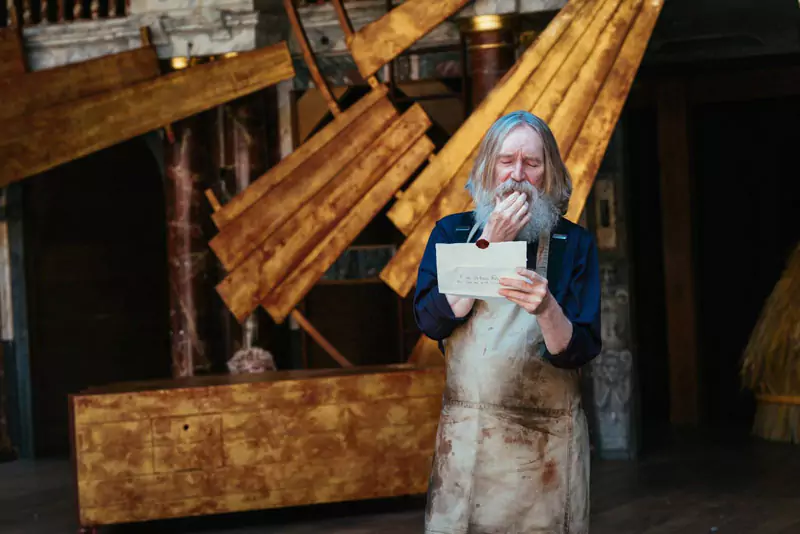
Pearce Quigley as Malvolio.
Photo credit: Helen Murray.
But the romantic entanglements of the main plot – complicated by the sexual ambivalence created by the female Viola disguised as the male Cesario and her similarity to her brother – are outshone in this production by all the shenanigans of the subplot around Malvolio. Olivia’s snobbish Puritan steward is very much the spoilsport of the drunken revelry of hangers-on Belch, Aguecheek and others, whom he regards as beneath him. More than usually, Malvolio is shown to be aspiring to be by his mistress’s side before the forged letter tricks of other servants prompt him to wear yellow stockings and cross-garters. The scheme is uproariously presented, including clever comic business with Malvolio several times throwing the letter away into the crowd before asking for it back. But the hilarity dissipates when the “mad” Malvolio is taunted in captivity and ends with unexpected poignancy as he makes his way out alone through the groundlings. It seems there is a dark fringe to the sun after all.
Belfield’s staging is impressively fluid, no more so than at the start (which actually leads with Viola’s line “What country, friends, is this?” rather than Orsino’s “If music be the food of love, play on”) when it alternates between Viola and the narrating Captain, Orsino’s court, and Olivia’s household. Good use is made of a mini-platform in the yard for Viola, then later Sebastian and Antonio’s arrival on Illyria as outsiders. And there is relaxed interaction between many members of the cast and the audience, two of whom come on stage gamely to take part in Belch and co.’s carousing, before a pyjama-clad, nightcap-wearing Malvolio carrying a Teddy bear interrupts the party and bellows at them, “Don’t you have homes to go to?”
Ronkẹ Adékoluẹjo makes an engaging Viola caught up in a love rivalry between Olivia and Orsino. But she doesn’t attempt enough physical differentiation between her main character and her role-playing as Cesario. Laura Hanna amusingly portrays Olivia’s transformation from detached dame to gushing girlishness as she changes from bereavement black to slinky gold, though Solomon Israel doesn’t make much impact as the languidly lovelorn Orsino.
Globe stalwart Pearce Quigley steals the show as he makes the most of a role he is so fitted to play as the dourly officious Malvolio, with a wonderfully dry and droll northern delivery of perfect comic timing – his attempted winning smile resembling a grimace that freezes his mouth when talking. And yet by the end we really feel his pain at being so humiliated.
Jos Vantyler is also excellent as a provocative, swaggering harlequin Feste who shows a distinctly cruel edge in his treatment of Malvolio, brilliantly alternating his voice with that of priest Sir Topas, as well as singing strongly. Jocelyn Jee Esien does well as the gender-swapped Lady Belch, a hip-flask-swilling ladette, while Ian Drysdale is funny as the posh-spoken, dim-witted Sir Andrew Aguecheek and Alison Halstead is a playful Maria up for any mischief. Kwami Odoom is the easy-going, bisexual Sebastian who – after sharing a passionate kiss – leaves behind Max Keeble’s besottedly loyal Antonio, who like Malvolio does not share in the general joy at the end.

